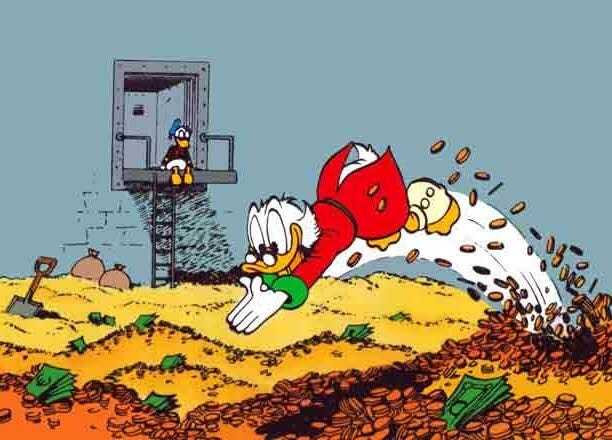So many companies cut their workforce as much as 10-15% citing that those jobs can be fully automated by the use of AI but I am still waiting to see any meaningful price cuts of their products from the said companies, etc.
Otherwise this will mean that they are doing this just to increase their profit margins and please their shareholders and don’t care about their customers or workforce.
Nope. Worker productivity has increased many fold over the last 50 years, meaning each person can produce many times more goods.
Wages have been stagnant and cost of living is through the roof, despite all of this increased efficiency, productivity, fewer workers and much cheaper operating costs.
We’re fucked lol
But the number, and wealth, of billionaires is way up!
“For a beautiful moment in history we created a lot of value for shareholders”
Genuine question. Why hasn’t free market forced the prices to drop? If company X makes Y twice as cheaply, it could drop its prices like 20% and having way more customers and way higher profits. Why hasn’t this ever happened?
Good question. I personally think it’s because of conglomerates and large companies. Nestle has so many brands that it’d be a full time job to avoid their products. They are unfathomably huge, and so are many other food companies. They know how to play ball with each other, people have to eat, and they will pay anything.
Additionally supermarket chains likely play into it, same concept. Walmarts, targets etc killed off many small business and local grocery stores, they can also charge whatever they want. In fact the dollar store would go to tiny towns, compete and murder the local grocery with low prices, and monopolize the towns food needs with processed crap, these are called food deserts.
Nestle has so many brands that it’d be a full time job to avoid their products.
Not quite. I actually checked a couple years back and there was only 1 product that I bought from them: bagged Starbucks coffee. I just had to switch to a local coffee roaster to fix that.
That being said, I tend to make the majority of my food from scratch, but that’s actually not that hard if you know what you’re doing. Plus I don’t eat snacks, which also helps.
Because “Free Market” is a myth.
Yeah, I always wondered this, why would competition lower prices? If something is selling at $100, why would I make it and sell it way below that?
Sure, I might give a small discount at first to lure customers, but once I have enough market share, wouldn’t I rather sell it for $100?
Competition lowers prices because ideally no one has a lot of “market share”. Think about a small farm community where 10 people have chickens, 10 people have pigs, 10 people grow wheat, 10 people grow carrots, etc. Maybe everyone grows potatoes or something, so those aren’t sold at the market. They’re just eaten.
This is a situation where no one person can control the price of things, but they still fluctuate based on supply and demand. Say it’s Christmas and everyone wants to make egg nog. The cost of eggs and cream will rise because farmers can’t just increase the amount of eggs and milk produced. Say there’s a crop sickness and half of the wheat dies. The price of wheat will rise, since farmers can’t make enough to satisfy the demand for bread.
After both of these problems have passed, the prices will come back down because no one person controls more than 10% of the price for their goods. If one person charged $6 per dozen eggs after Christmas was over (everyone else charges $5, as normal), they would not sell very many eggs. The average price is not increasable by one person. And any one person could quickly sell all their eggs just by charging slightly less. (This assumes that goods are interchangeable in quality.)
Your assuming the sellers are not cooperating with each other.
Sure, at first it could be like that, but as time goes on, those 10 people would either form a group, merge into a few or just one, or even just at one point suggest to each other to keep a certain price.
My point is, there is no guarantee that the sellers would play by the “ideal rules” when they just have one goal.
I mean it’s technically illegal, but then so are a lot of things.
Another thing that they could do that I just realized is following bad examples.
Once there are established players and one of them is big enough, it would just do a anti consumer practice for the sake of better profits, once competition notices sales didn’t drop significantly, competitors follow suite.
A great real world example is the headphone jack, replaceable phone batteries and the screen notch.
Well it has but it isnt going to be commented on. My house was built in 1899 and we have a shortage of closet space remember once getting annoyed and wondering out loud “did people just have less clothing at one point”. I said that as a man who quite literally did an engineering internship with a textile machine company. Of course clothing has gotten a lot cheaper.
Now cost disease is hitting us all where it hurts so of course it is the thing we all comment on.
But hey we can’t afford a degree, a doctor, a place to live, or to go to a restaurant anymore but on the plus side you can buy anything mass produced for very little.
To some degree barrier of entry. Let’s say I want to create a smartphone. I know it’s possible to do it cheaper, without selling customer data or with special features.
You would need crazy amounts of start captial to even enter the market and the current leaders would make your entry as miserable as they could with huge sales and temporary minor pro consumer moves.
If you could get the captial you would probably fail there or cave and accept some kind of deal where you become rich and your company gets ingested and dissolved by current market leaders.
I hope UAW gets and starts the 4 day workweek trend. I doubt employers will suddenly start paying decent wages so that might be the best we get.
I hope they lead a general strike in 2028
Are you discovering capitalism now?

As soon as we finish swimming…
Your first mistake was thinking large companies care about customers - you’re just an obstacle to your wallet
Workers are just obstacles to their labour
The most amount of your money possible should spend the least amount of time possible in your bank account. In fact, you’re probably a terrorist if you don’t simply sign over your entire monthly income to BigCorp, you terrorist.
Just like paying decent wages is just seen as a loss of money for them.
My father once tried to tell me that capitalism was fundamentally about making people happy. Because, see, the whole point is bringing to market a product that people want to give you their money for. That’s the whole point, you see. The people wanting things. The money is just a by-product, you probably shouldn’t pay too much attention to it. It’s not like another word for money is “capital” or anything.
What a riot.
Otherwise this will mean that they are doing this just to increase their profit margins and please their shareholders and don’t care about their customers or workforce.
Oh my sweet summer child… that’s exactly what it means. Always has.
So buy ETFs
Yeah economics is about “how do I maximize profit and never reduce prices.” Then they just lie about how supply and demand works or how productivity increases and mergers will help prices go down. Prices only ever go up.
NO COMPANY WILL WILLINGLY GIVE UP MORE PROFIT.
The way supply and demand works is the thing that forces companies to give up profit is a competing company willing to take a little less profit (and hence undercut prices).
It doesn’t work if there’s no competition, or insufficient competition.
So in other words, it doesnt work in the real world
It does work in the real world. That’s why food doesn’t cost a billion dollars a meal.
That being said, the forced business closures we had a couple years ago definitely consolidated markets, reducing competition and driving prices way up.
Sounds like there is a space for a competitor if anyone with enough capital wants to invest. It’s one industry, Michael. How much could it cost, ten million dollars?
That’s pretty much it in a nutshell. Anyone with the hundreds of billions of dollars necessary to compete in that space is already there, and doing layoffs.
exactly
economics is a dumb field, we should get rid of it (and the economy)
Shall we drop a few asteroids on the planet while we’re talking about destroying ourselves?
Don’t defend economics, you aren’t being paid too. All of economic thought is either trivially true or brought to you by someone who has a motivation to lie.
If you were to follow Adam Smith to the letter, it will Eventually® get cheaper: lower production cost leads to increased supply, and unemployment leads to decreased demand. Both forcing the prices down.
In practice, though, there are at least two problems with this reasoning:
- The hand of the market has Parkinson’s. Sure, it might “eventually” put things in place, but before that the hand will keep shaking things up and down, while people still need to live.
- Smithsonian supply and demand assumes an infinitely competitive free market. There’s none - and specially not in this current situation, where you got oligopolies everywhere, and plenty services+goods have huge natural costs of entry.
In those situations I’d simply ditch Smith and look at Marx instead.
This. The invisible hand doesn’t work if monopolists buy control of all the fingers.
I think Smith would probably prefer playing ball with Marx over whatever this hellscape is
Got any book recommendations on this topic?
Capital. It’s the biggest and best for a reason.
If that’s too daunting, read Wage Labor and Capital as well as Value, Price, and Profit. Both combined are far shorter than 1 volume of Capital.
Cowbee already answered it. But really - I recommend going straight to the sources: The Wealth of Nations and The Capital. Preferably in annotated versions, specially for Marx as it’s a bit harder to digest (sadly I can’t recommend a specific one as I didn’t read either book in English).
Otherwise this will mean that they are doing this just to increase their profit margins and please their shareholders and don’t care about their customers or workforce.
All for profit business moves are always in the direction of lowering the cost to maximise the profit.
There have been instances where shareholders have removed executive officers because they wanted to go down that path but that goes against the priorities of the shareholders.
If I recall correctly, the shareholders also can and will sue you if you make a decision that earns them less money than if you had done something more profitable for them. So the companies have a legal incentive to only serve their shareholders.
In the pockets of investors?
It just means billionaires can do another few victory laps around the Earth in their private jets while the world burns. We need to eliminate them and institute universal basic income
The core thing the rich left out when they invented “Trickle Down Economics” was that it’s not money that trickles down onto us.
Same goes for efficiency or productivity improvements. Those haven’t done to the US workers since Nixon, and definitely not since Regan.
Trickle down wasn’t invented in the 1980s. It was a rebranding of what was previously pilloried as horse and sparrow economics in that if you let horses gorge on oats, some undigested oat will pass through their systems and be deposited in the fields for the sparrows to eat.
Gee, I wonder why they rebranded.
Human centipede economics.
Far more accurate lol. Nothing’s trickling down except some half-digested oats covered in horseshit
Why the hell would they do that when their customers are already willing to pay the current prices?
Suppose you make widgets at a cost of $50 and sell them online for $100 each. Through the use of AI, you were able to fire half of your employees and now the cost of producing a widget is down to $30, a net saving of $20.
Why would you choose to lower the price of the widget from $100 to $80 instead of continuing to sell the widget at $100 and pocketing the $20 for yourself? What incentive have you got to reduce your price?
Exactly. And the same thing will happen when fusion energy is figured out: energy prices remain the same, almost 100% of revenue gets pocketed as profit. “Limitless free energy” my ass.
You spelled “Wage Cuts” wrong.
Often companies don’t charge based on productions costs, they charge based on what they can get people to pay. If every competitor in an industry agrees to do the same there’s no incentive to lower selling price. The company doesn’t have to worry about customers leaving for a meaningfully cheaper competitor because everyone is charging as much as consumers will bear. Without that “best/cheapest” outside pressure any efficiency increases can be put into lowering costs like labor and thus increasing profits. It’s why prices don’t drop and suddenly there’s a lot more people within a few missed paychecks of serious trouble (the economy being roughly tuned to keep the most people possible paying as much as they can sustain).
Disclaimer: this is just my two cents, with some research but admittedly not a lot and no formal economics education. Feel free to tell me if I’m wrong.
You’re not wrong. It’s only criminal on paper and when it makes the news, but the fines to stop and prevent it are minimal.
I never heard of any company promising price cuts due to AI and layoffs. Even if they had, I wouldn’t have believed it one bit.














